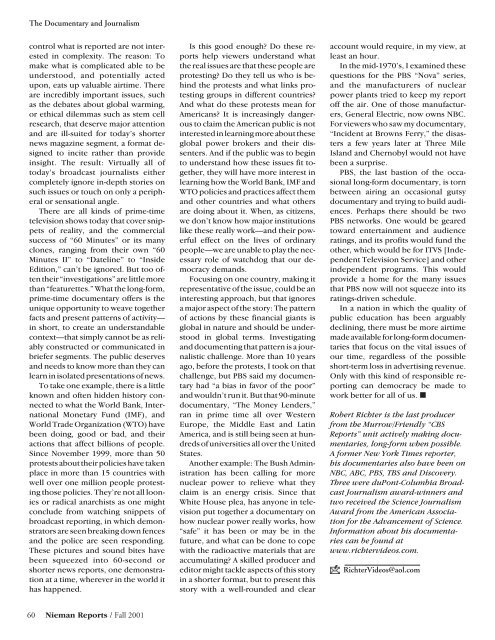Download - Nieman Foundation - Harvard University
Download - Nieman Foundation - Harvard University
Download - Nieman Foundation - Harvard University
You also want an ePaper? Increase the reach of your titles
YUMPU automatically turns print PDFs into web optimized ePapers that Google loves.
The Documentary and Journalismcontrol what is reported are not interestedin complexity. The reason: Tomake what is complicated able to beunderstood, and potentially actedupon, eats up valuable airtime. Thereare incredibly important issues, suchas the debates about global warming,or ethical dilemmas such as stem cellresearch, that deserve major attentionand are ill-suited for today’s shorternews magazine segment, a format designedto incite rather than provideinsight. The result: Virtually all oftoday’s broadcast journalists eithercompletely ignore in-depth stories onsuch issues or touch on only a peripheralor sensational angle.There are all kinds of prime-timetelevision shows today that cover snippetsof reality, and the commercialsuccess of “60 Minutes” or its manyclones, ranging from their own “60Minutes II” to “Dateline” to “InsideEdition,” can’t be ignored. But too oftentheir “investigations” are little morethan “featurettes.” What the long-form,prime-time documentary offers is theunique opportunity to weave togetherfacts and present patterns of activity—in short, to create an understandablecontext—that simply cannot be as reliablyconstructed or communicated inbriefer segments. The public deservesand needs to know more than they canlearn in isolated presentations of news.To take one example, there is a littleknown and often hidden history connectedto what the World Bank, InternationalMonetary Fund (IMF), andWorld Trade Organization (WTO) havebeen doing, good or bad, and theiractions that affect billions of people.Since November 1999, more than 50protests about their policies have takenplace in more than 15 countries withwell over one million people protestingthose policies. They’re not all looniesor radical anarchists as one mightconclude from watching snippets ofbroadcast reporting, in which demonstratorsare seen breaking down fencesand the police are seen responding.These pictures and sound bites havebeen squeezed into 60-second orshorter news reports, one demonstrationat a time, wherever in the world ithas happened.Is this good enough? Do these reportshelp viewers understand whatthe real issues are that these people areprotesting? Do they tell us who is behindthe protests and what links protestinggroups in different countries?And what do these protests mean forAmericans? It is increasingly dangerousto claim the American public is notinterested in learning more about theseglobal power brokers and their dissenters.And if the public was to beginto understand how these issues fit together,they will have more interest inlearning how the World Bank, IMF andWTO policies and practices affect themand other countries and what othersare doing about it. When, as citizens,we don’t know how major institutionslike these really work—and their powerfuleffect on the lives of ordinarypeople—we are unable to play the necessaryrole of watchdog that our democracydemands.Focusing on one country, making itrepresentative of the issue, could be aninteresting approach, but that ignoresa major aspect of the story: The patternof actions by these financial giants isglobal in nature and should be understoodin global terms. Investigatingand documenting that pattern is a journalisticchallenge. More than 10 yearsago, before the protests, I took on thatchallenge, but PBS said my documentaryhad “a bias in favor of the poor”and wouldn’t run it. But that 90-minutedocumentary, “The Money Lenders,”ran in prime time all over WesternEurope, the Middle East and LatinAmerica, and is still being seen at hundredsof universities all over the UnitedStates.Another example: The Bush Administrationhas been calling for morenuclear power to relieve what theyclaim is an energy crisis. Since thatWhite House plea, has anyone in televisionput together a documentary onhow nuclear power really works, how“safe” it has been or may be in thefuture, and what can be done to copewith the radioactive materials that areaccumulating? A skilled producer andeditor might tackle aspects of this storyin a shorter format, but to present thisstory with a well-rounded and clearaccount would require, in my view, atleast an hour.In the mid-1970’s, I examined thesequestions for the PBS “Nova” series,and the manufacturers of nuclearpower plants tried to keep my reportoff the air. One of those manufacturers,General Electric, now owns NBC.For viewers who saw my documentary,“Incident at Browns Ferry,” the disastersa few years later at Three MileIsland and Chernobyl would not havebeen a surprise.PBS, the last bastion of the occasionallong-form documentary, is tornbetween airing an occasional gutsydocumentary and trying to build audiences.Perhaps there should be twoPBS networks. One would be gearedtoward entertainment and audienceratings, and its profits would fund theother, which would be for ITVS [IndependentTelevision Service] and otherindependent programs. This wouldprovide a home for the many issuesthat PBS now will not squeeze into itsratings-driven schedule.In a nation in which the quality ofpublic education has been arguablydeclining, there must be more airtimemade available for long-form documentariesthat focus on the vital issues ofour time, regardless of the possibleshort-term loss in advertising revenue.Only with this kind of responsible reportingcan democracy be made towork better for all of us. ■Robert Richter is the last producerfrom the Murrow/Friendly “CBSReports” unit actively making documentaries,long-form when possible.A former New York Times reporter,his documentaries also have been onNBC, ABC, PBS, TBS and Discovery.Three were duPont-Columbia BroadcastJournalism award-winners andtwo received the Science JournalismAward from the American Associationfor the Advancement of Science.Information about his documentariescan be found atwww.richtervideos.com.RichterVideos@aol.com60 <strong>Nieman</strong> Reports / Fall 2001
















